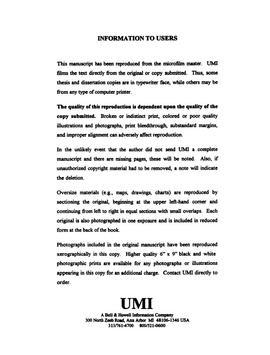| dc.contributor.advisor | Greene, Barbara, | en_US |
| dc.contributor.author | Lopp, Annette Louise Baker. | en_US |
| dc.date.accessioned | 2013-08-16T12:30:17Z | |
| dc.date.available | 2013-08-16T12:30:17Z | |
| dc.date.issued | 1998 | en_US |
| dc.identifier.uri | https://hdl.handle.net/11244/5701 | |
| dc.description.abstract | Analysis of the interviews indicated that faculty do not have a common definition of mathematical ability and while all believed that students could learn, a few voiced the belief that students have ceilings or limits to their ability. Faculty with high retention and pass rates reported use of more activities and more active learning structures in the classroom. Cooperative group activities and boardwork were reported actively used by them. Those with low rates selected primarily lecture and imbedded problem questions. Control was referenced by the 3 younger males and the attitude of students was often mentioned as a concern limiting achievement. Faculty attitude may be another consideration. | en_US |
| dc.description.abstract | Four fulltime mathematics faculty from two different community colleges in a southwestern metropolitan city were selected based on either high or low retention and pass rates. Eight faculty were interviewed and their replies were compared and investigated. | en_US |
| dc.description.abstract | Implications include inservice professional development programs focused on learning theories, active learning strategies, task involvement vs ego involvement, and students' perception of task meaning as related to learning and ability level change. Another important consideration would be a comparison of the reasons faculty choose the classroom structures and the reasons community college students choose to engage in or not engage in those structures. Both faculty and student beliefs and perceptions will continue to be an important consideration for research and discussion. | en_US |
| dc.description.abstract | Due to community college faculty and staff concerns about low adult student retention and pass rates, an exploratory study of mathematics faculty definitions of mathematical ability, their beliefs about the nature of mathematical ability, and the classroom structures implemented was conducted. The purpose of the study was to explore the possibility that faculty definitions, beliefs, and usage of classroom structures may contribute to having higher or lower retention and pass rates. | en_US |
| dc.format.extent | x, 140 leaves ; | en_US |
| dc.subject | Motivation in education. | en_US |
| dc.subject | Learning strategies. | en_US |
| dc.subject | Expectation (Psychology) | en_US |
| dc.subject | Education, Educational Psychology. | en_US |
| dc.subject | Education, Community College. | en_US |
| dc.subject | Education, Mathematics. | en_US |
| dc.subject | Community college students. | en_US |
| dc.subject | Academic achievement. | en_US |
| dc.title | Faculty definitions of and beliefs about student ability: Are they related to classroom structures, student retention, and student pass rates? | en_US |
| dc.type | Thesis | en_US |
| dc.thesis.degree | Ph.D. | en_US |
| dc.thesis.degreeDiscipline | Department of Educational Psychology | en_US |
| dc.note | Adviser: Barbara Greene. | en_US |
| dc.note | Source: Dissertation Abstracts International, Volume: 59-09, Section: A, page: 3351. | en_US |
| ou.identifier | (UMI)AAI9905617 | en_US |
| ou.group | Jeannine Rainbolt College of Education::Department of Educational Psychology | |
